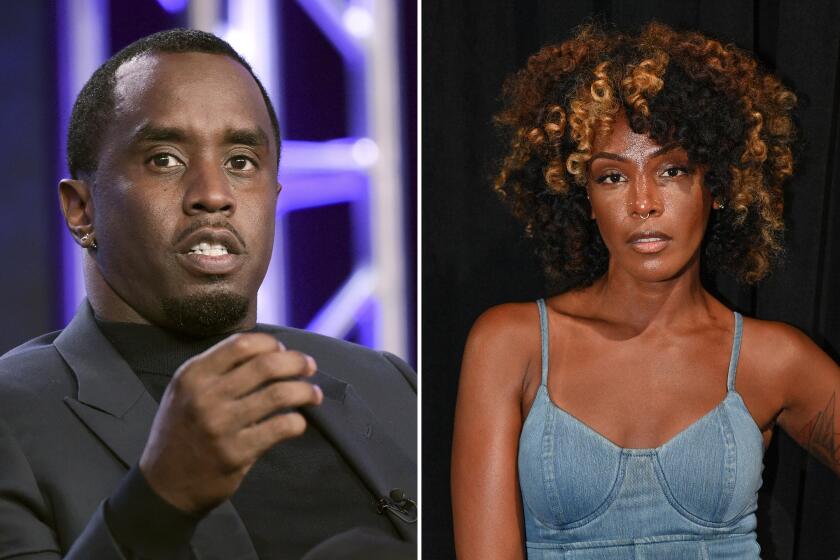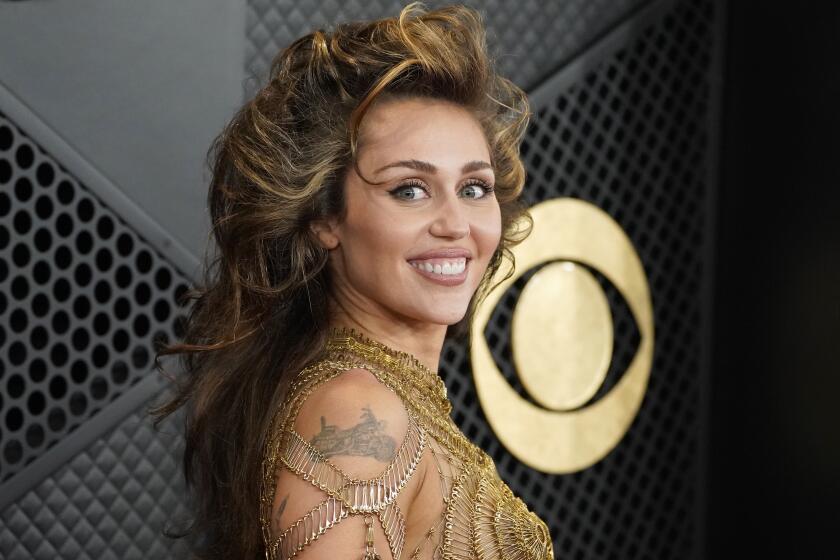For young female pop stars, dropping choice F-bombs in songs proves liberating and profitable

Gayle was 6 years old when CeeLo Green released the gleefully profane “F— You” in 2010 — old enough to be thrilled by the song’s signature four-letter obscenity, young enough to think she might get away with performing it at an elementary school talent show.
“I told my mom I wanted to do it, and she looked it up and was like, ‘Oh my God — no,’” the singer, now 17, says with a laugh.
A decade and change later, Gayle (born Taylor Gayle Rutherford) is the one setting off parents’ alarm bells with “abcdefu,” her gloriously caustic grunge-pop smash in which she tells a feckless ex, “F— you and your mom and your sister and your job / And your broke-ass car and that s— you call art.” Inescapable over the last few months on TikTok and Instagram, the song reached a new peak of No. 3 last week on Billboard’s Hot 100; since it came out in August, it’s racked up more than half a billion streams on Spotify and YouTube.
As cleverly as it deploys its harsh language, “abcdefu” is just the latest in a series of big pop songs to brandish the F-word, including Olivia Rodrigo’s “Drivers License” and “Good 4 U,” both of which hit No. 1 last year, and Billie Eilish’s “Happier Than Ever,” which will compete against “Drivers License” for record of the year and song of the year at next month’s Grammy Awards. In November, Taylor Swift topped the Hot 100 with a 10-minute re-recording of her old song “All Too Well” that features a conspicuous F-bomb. And Demi Lovato just teamed with Winnetka Bowling League for a collaborative single called “Fiimy” — short for “F— it, I miss you.”
(Warning: video contains aforementioned swear word.)

Curse words are nothing new in pop music, of course. Says Winnetka Bowling League’s Matthew Koma, who duets with Lovato in “Fiimy” and has written songs for Zedd and 5 Seconds of Summer: “Every few years, I think the idea to say something really bluntly feels original again, so everyone feels like they have a license to do it.” (Koma himself remembers being struck by folk-punk singer Ani DiFranco’s use of the F-word in her 1996 song “Untouchable Face.”)
What is new is who’s dropping the F-bombs: young female artists whose speech has historically been far more tightly policed than that of their freewheeling male counterparts. Beyond the A-listers scoring platinum plaques and Grammy nominations with foulmouthed bangers, Spotify’s popular Teen Beats playlist showcases explicit tunes by up-and-comers including Nessa Barrett’s “Dying on the Inside,” Lexi Jayde’s “Drunk Text Me,” Cat Burns’ “Go” and “Fast Times” by Sabrina Carpenter, the former Disney Channel star said to have played a role in the real-life romantic drama behind Rodrigo’s “Drivers License.”
A year ago, Olivia Rodrigo was a Disney actor with a knack for songwriting. Today, the 18-year-old has 2021’s top debut album and is nominated for 7 Grammys.
Each uses the F-word to different ends: In Carpenter’s breezy soul-pop jam, it’s a way to get across her excitement about a new romance; in Barrett’s throbbing disco-goth track, the word underlines the pain of an eating disorder. Yet all of them reach for a level of intensity that rockers and rappers have had access to for decades.
“I knew that ‘abc’ had the possibility of offending people,” says Gayle, who was born in Dallas and now lives in Nashville. “I didn’t think it was offensive. But I know that a teenage girl being very comfortable in her emotions and in her anger and not being apologetic about it — that can be jarring to some people.”
Gayle recalls playing “abcdefu” for her grandmother for the first time. “And obviously I was nervous about what she was gonna say.” After the song, her grandmother “looked at me and was like, ‘You get to say all the things that I wasn’t able to at 17.’ Kind of put everything into perspective.”
So what’s enabling these young women to find an audience without censoring themselves as their predecessors had to? Gayle points to the rise of digital streaming, which has largely supplanted Top 40 radio as the place where pop hits are made — minus the moderating hand of programmers nervous about falling foul of the Federal Communications Commission.
“On the radio you can’t curse,” she says. “Spotify and TikTok and all these other platforms started bringing eyes to songs that didn’t necessarily have to follow the old rules.”
Adds Kara DioGuardi, the veteran pop songwriter and former “American Idol” judge who signed Gayle to her Arthouse label: “Streaming allows artists to tell their story in the way they want.”

For Spotify, that promise of creative freedom has led to trouble involving the platform’s relationship with its star podcaster, Joe Rogan, who critics say has spread COVID-19 misinformation on his show. Yet Sulinna Ong, Spotify’s global head of editorial, says streaming technology “allows women to reclaim their agency” in a culture that still treats “women’s expression of anger and frustration as the ultimate taboo.
“There’s no philosophical difference between the Kid Laroi and Gayle other than sexist expectations,” Ong says, referring to the 18-year-old Australian singer and rapper with a massive streaming hit in his album “F— Love.”
But if streaming has facilitated the use of the F-word, with its punchy hard-consonant ending, why are artists and listeners increasingly drawn to it in the first place? According to Ong, the “vast majority” of Spotify users opt for an explicit version of a given song even when a clean version is available. “abc (Nicer),” an edited take on Gayle’s hit, has 6 million plays versus the original’s 473 million. Small wonder, then, that none of the execs the singer works with “were ever like, ‘Do you think you say “f—” one too many times?’” Gayle says with a laugh.
Cultural observers lament an overall coarsening of our verbal discourse — see the pearl-clutching over Cardi B and Megan Thee Stallion’s ultra-raunchy “WAP” and the outrage over former President Trump’s often-impolite language. (Until recently, The Times rarely allowed four-letter words to even be rendered with em dashes.) In DioGuardi’s view, the proliferation of F-bombs is merely bringing pop into alignment with how kids talk in real life (and on social media). “If you’re thinking that teenagers don’t use those words,” she says, “then you’re not really being honest with yourself.”
Said Rodrigo last year in an interview with Nylon: “I have a dirty mouth.”

Ruby Ryan, a 12-year-old middle-school student from Los Angeles, was surprised the first time she heard “Drivers License” — in which Rodrigo sings, “I still f— love you, babe” — because she’d seen the singer and actress on Disney’s “High School Musical: The Musical: The Series,” “and I never heard her talk like that on the show,” Ryan says. (Indeed, for kiddie-TV veterans like Rodrigo and Carpenter, a choice F-bomb can provide a kind of rhetorical bridge to adulthood.)
“But obviously,” Ryan adds, “the song wasn’t the first time I heard the word.” Ryan’s dad, Brandon, who’s 49 and works in product marketing at the Roland musical-instrument company, says he doesn’t fear his daughter’s exposure to rough language in a musical context: “It’s not like she’s gonna melt into a puddle.”
For Brandon, it’s about “whether or not the word serves the artist’s vision,” which Ruby thinks has generally been the case in songs about how young women navigate a world defined by instant, unfiltered communication. Incorporating the occasional cuss, Ruby says, “makes the music feel more modern.”
The F-word also has a unique emotional value. Koma says there’s “a weight to it” that’s crucial to the story he and Lovato tell in “Fiimy” about two lovers reconnecting despite their misgivings. “You’re building up this whole narrative to basically say, ‘Regardless of all this other s—, I miss you,’” he explains. “It doesn’t have that same we’ve-arrived-at-this feel when you can’t say the word.”
In “abcdefu,” DioGuardi says, Gayle is singing from the point of view of “a very reasonable person who tried to give her boyfriend the benefit of the doubt and take the high road, and he was not doing the same by her. And in that moment, she’s like, ‘You don’t get to do that to me. F— you!’
“I mean, how else would you put it?” DioGuardi asks. “If I could’ve used the word back when I was writing” — her hits from the early 2000s include Ashlee Simpson’s “Pieces of Me” and Christina Aguilera’s “Ain’t No Other Man” — “I totally would have.”

At least one female pop superstar did use the word back in 2011: That year Pink scored a No. 2 hit with “F— Perfect,” a feel-good empowerment jam about the illusory nature of perfection. But Pink was in her early 30s when “F— Perfect” came out, not a teenager like Gayle or the recently turned 19-year-old Rodrigo. And in the pre-streaming age, the curse-free radio edit of Pink’s song was likely more ubiquitous than the unexpurgated version available to buyers of CDs and MP3s; today, YouTube and Spotify playlists, the latter of which Ong says rarely feature clean edits, are the radio for millions of listeners like Ruby Ryan, who says she tunes into AM/FM stations only “once in a while, maybe in the car.”
Which isn’t to say the clean edit is a thing of the past — or that pop acts no longer care about Top 40 radio.
“I look at radio as being sort of that tipping point where what you find at Spotify becomes mainstream and multigenerational,” DioGuardi says. Koma acknowledges he’s prepared a censored take on “Fiimy” in case the song takes off on streaming and starts attracting interest from programmers.
That’s what happened with “abcdefu,” which months after topping Spotify’s Global Top 50 chart reached No. 1 last week — albeit with Gayle telling her ex, “Forget you” — on Billboard’s national airplay tally.
The singer, who’s set to play the Roxy in West Hollywood on Monday and release a new EP on March 18, is philosophical about having to make an old-school concession — the same one, as it happens, that CeeLo made to get “F— You” on the airwaves in 2010.
“Would I love to be able to say ‘f—’ on the radio? Yes,” Gayle says. “But [at 17] I don’t know what it’s like to be driving my kids to school at 7 a.m. and then hear this super-vulgar song and not be able to control it. So I understand the rules and regulations.
“Even if ‘Forget you’ hurts my heart a little bit.”
More to Read
The biggest entertainment stories
Get our big stories about Hollywood, film, television, music, arts, culture and more right in your inbox as soon as they publish.
You may occasionally receive promotional content from the Los Angeles Times.












